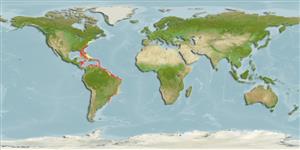Common names from other countries
Environment: milieu / climate zone / depth range / distribution range
Ökologie
seewasser demersal; tiefenbereich 1 - 90 m (Ref. 5217), usually 10 - 50 m (Ref. 5217). Tropical; 41°N - 33°S, 85°W - 34°W
Western Atlantic: New York, USA and northeastern Gulf of Mexico to Brazil. There are no records from any Antillean location (Ref. 51183).
Size / Gewicht / Alter
Maturity: Lm ? range ? - ? cm
Max length : 25.0 cm TL Männchen/unbestimmt; (Ref. 7251); common length : 18.0 cm TL Männchen/unbestimmt; (Ref. 5217)
Rückenflossenstacheln (insgesamt) : 0; Rückenflossenweichstrahlen (insgesamt) : 78 - 90; Afterflossenstacheln: 0; Afterflossenweichstrahlen: 59 - 68.
Occurs in bays, lagoons, and shallow coastal waters. Found on soft bottoms of continental shelf to a depth of about 90 m, more common between 10-50 m (Ref. 5217). Feeds on crustaceans, polychaetes and mollusks (Ref. 36453).
Life cycle and mating behavior
Maturities | Fortpflanzung | Spawnings | Egg(s) | Fecundities | Larven
Robins, C.R. and G.C. Ray, 1986. A field guide to Atlantic coast fishes of North America. Houghton Mifflin Company, Boston, U.S.A. 354 p. (Ref. 7251)
IUCN Rote Liste Status (Ref. 130435)
CITES (Ref. 128078)
Not Evaluated
Bedrohung für Menschen
Harmless
Nutzung durch Menschen
Fischereien: weniger kommerziell
Tools
Zusatzinformationen
Download XML
Internet Quellen
Estimates based on models
Preferred temperature (Ref.
115969): 21.2 - 28, mean 25.4 (based on 360 cells).
Phylogenetic diversity index (Ref.
82804): PD
50 = 0.5000 [Uniqueness, from 0.5 = low to 2.0 = high].
Bayesian length-weight: a=0.01000 (0.00426 - 0.02347), b=3.07 (2.89 - 3.25), in cm Total Length, based on LWR estimates for this Genus-body shape (Ref.
93245).
Trophic level (Ref.
69278): 3.7 ±0.30 se; based on food items.
Widerstandsfähigkeit (Ref.
120179): mittel, Verdopplung der Population dauert 1,4 - 4,4 Jahre. (Preliminary K or Fecundity.).
Fishing Vulnerability (Ref.
59153): Low vulnerability (15 of 100).
